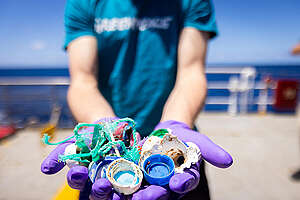Professor Garnaut said he is hoping for a global agreement to limit greenhouse emissions to a level that is in Australia’s best interest as he delivered his final report to a press conference at Parliament House yesterday.
Keeping greenhouse emission levels to 450 parts per million (ppm) is the minimum that scientists say needs to be done if we are to have a hope of avoiding catastrophic climate change. Professor Garnaut’s report concludes that it is in Australia’s interest for the world to agree to the 450ppm goal. He says such cuts are feasible, the costs manageable and that we can do it while continuing to see living standards grow strongly.
Garnaut also said Australia should be prepared to do its full part to achieve a global goal of 450 ppm. He reckons that will mean a 25% cut in emissions by 2020 and a long-term target of 90% reductions by 2050.
Despite this, Garnaut has still second guessed the international community and assumed that deep cuts are beyond the reach of international negotiations at this stage. More than a year away from the meeting where countries will reach a final agreement, Garnaut is saying that the cuts needed to save the Great Barrier Reef, Kakadu wetlands and the Murray Darling Basin are off the table.
But are they? At the last international meeting in Bali in December 2007, the range of 25-40% cuts was front and centre. The European Union has committed to 20% cuts by 2020, and will go to 30% if other nations get on board.
So, for Australians who care about climate change, hope lies with Mr Rudd – will he get on board with the EU and others and commit to Australia doing its bit? Mr Rudd can use his international relations with China, the USA and other nations to lead negotiations.
Clearly, for Australia to take leadership at these negotiations, we need to champion 450 ppm or better – this is what Australia needs to say it’s willing to do to achieve a safe climate future, and we need to put that commitment on the negotiation table.
Garnaut said that Australia’s saving grace is its people, and their deep concern about climate change and support for action. So, it’s over to the people to maintain the call for action on climate change, regardless of the short-term financial market crisis, and despite the pessimism of Garnaut.
He concludes his report by saying that if the world fails to reach an effective global agreement to address climate change, then the failure of our generation would lead to consequences that would haunt humanity until the end of time.
That’s not the legacy that I want my generation to leave.
See how you can maintain the call for action on climate change

